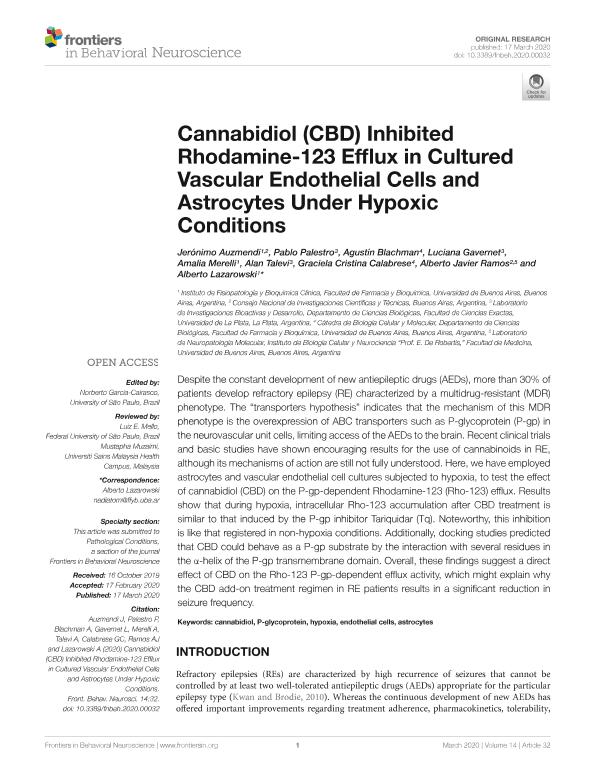Artículo
Cannabidiol (CBD) inhibited rhodamine-123 efflux in cultured vascular endothelial cells and astrocytes under hypoxic conditions
Auzmendi, Jerónimo Andrés ; Palestro, Pablo Hernán
; Palestro, Pablo Hernán ; Blachman, Agustin; Gavernet, Luciana
; Blachman, Agustin; Gavernet, Luciana ; Merelli, Amalia Margarita; Talevi, Alan
; Merelli, Amalia Margarita; Talevi, Alan ; Calabrese, Graciela Cristina; Ramos, Alberto Javier
; Calabrese, Graciela Cristina; Ramos, Alberto Javier ; Lazarowski, Alberto Jorge
; Lazarowski, Alberto Jorge
 ; Palestro, Pablo Hernán
; Palestro, Pablo Hernán ; Blachman, Agustin; Gavernet, Luciana
; Blachman, Agustin; Gavernet, Luciana ; Merelli, Amalia Margarita; Talevi, Alan
; Merelli, Amalia Margarita; Talevi, Alan ; Calabrese, Graciela Cristina; Ramos, Alberto Javier
; Calabrese, Graciela Cristina; Ramos, Alberto Javier ; Lazarowski, Alberto Jorge
; Lazarowski, Alberto Jorge
Fecha de publicación:
17/03/2020
Editorial:
Frontiers Media S.A.
Revista:
Frontiers in Behavioral Neuroscience
ISSN:
1662-5153
Idioma:
Inglés
Tipo de recurso:
Artículo publicado
Clasificación temática:
Resumen
Despite the constant development of new antiepileptic drugs (AEDs), more than 30% of patients develop refractory epilepsy (RE) characterized by a multidrug-resistant (MDR) phenotype. The “transporters hypothesis” indicates that the mechanism of this MDR phenotype is the overexpression of ABC transporters such as P-glycoprotein (P-gp) in the neurovascular unit cells, limiting access of the AEDs to the brain. Recent clinical trials and basic studies have shown encouraging results for the use of cannabinoids in RE, although its mechanisms of action are still not fully understood. Here, we have employed astrocytes and vascular endothelial cell cultures subjected to hypoxia, to test the effect of cannabidiol (CBD) on the P-gp-dependent Rhodamine-123 (Rho-123) efflux. Results show that during hypoxia, intracellular Rho-123 accumulation after CBD treatment is similar to that induced by the P-gp inhibitor Tariquidar (Tq). Noteworthy, this inhibition is like that registered in non-hypoxia conditions. Additionally, docking studies predicted that CBD could behave as a P-gp substrate by the interaction with several residues in the α-helix of the P-gp transmembrane domain. Overall, these findings suggest a direct effect of CBD on the Rho-123 P-gp-dependent efflux activity, which might explain why the CBD add-on treatment regimen in RE patients results in a significant reduction in seizure frequency.
Palabras clave:
ASTROCYTES
,
CANNABIDIOL
,
ENDOTHELIAL CELLS
,
HYPOXIA
,
P-GLYCOPROTEIN
Archivos asociados
Licencia
Identificadores
Colecciones
Articulos(CCT - LA PLATA)
Articulos de CTRO.CIENTIFICO TECNOL.CONICET - LA PLATA
Articulos de CTRO.CIENTIFICO TECNOL.CONICET - LA PLATA
Citación
Auzmendi, Jerónimo Andrés; Palestro, Pablo Hernán; Blachman, Agustin; Gavernet, Luciana; Merelli, Amalia Margarita; et al.; Cannabidiol (CBD) inhibited rhodamine-123 efflux in cultured vascular endothelial cells and astrocytes under hypoxic conditions; Frontiers Media S.A.; Frontiers in Behavioral Neuroscience; 14; 32; 17-3-2020; 1-11
Compartir
Altmétricas



